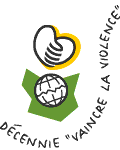Human trafficking: violence against humanity
Fourteen-year old Gudiya Putul is not in Kingston, Jamaica attending the International Ecumenical Peace Convocation (IEPC), but her name and history were brought to the attention of some IEPC participants Saturday during a workshop about economic injustice and human trafficking.
Putul (not her real name) is originally from a village in West Bengal, India. Her bad days began when her father died two years ago.
Her mother remarried a man who was an alcoholic. Putul and her mother moved to her stepfather’s village. Her stepfather’s drunken brawls often ended in the sound of him beating Putul and her mother.
Putul’s dream of studying was shattered before she realized what was done to her. She was rescued from the misery of life by a “sympathetic aunt” from the neighbourhood. The promises of a better life took her to Sonagachi – a city known for flesh trade in West Bengal.
Then one day her bedroom door was opened around midnight and an old man came into the room and physically tortured her because she refused to surrender to him.
The story of Putul was told by Sanjana Das, of the Church of North India who was one of the organizers of an IEPC workshop called “Combating Human Trafficking: Churches’ Role in Tackling Emerging Vulnerabilities”.
It would be easiest to deal with Putul as a statistic, that she is one among thousands of unnamed children in India who are forced into prostitution. But she is not a statistic. And like the rest of the children whose childhoods are denied, she is a human being in need of love, a home, an education and justice.
Despite this an increasingly growing number of young girls, mostly children, are added to the flesh trade and migrated from rural to urban areas. The figure of minor prostitutes in Delhi, India, is as high as 30,000 to 50,000 according to a report of the National Commission for Women in India.
Human trafficking is not an isolated issue and not limited to the sex trade. It is the consequence of poverty and discrimination of the powerless. The strong prey on the weak. It is part of the violence of a global economic system that dehumanizes people while maximizing profit.
Sanjana Das estimates that 80 percent of the trafficking worldwide is happening across international boarders. Usually, people from poor countries are being submitted to modern forms of slavery in rich countries.
The UN defined human trafficking as “a crime against humanity” that involves “an act of recruiting, transporting, transferring, harbouring or receiving a person through a use of force, coercion or other means, for the purpose of exploiting them.”
The cooperation with partners such as UN Women in combating human trafficking in India has led the Church of North India to become a strong actor in the advocacy for more effective children-friendly legal systems.
Human trafficking is organized crime. The children and young adults taken from their homes are submitted to sexual exploitation, forced labour, forced marriage, to fight as child soldiers or serve as forced donors to organ trafficking. And this is not happening in India alone. Participants of the IEPC workshop shared examples of advocacy networks in the United States and Latin America as well.
High resolution photos of the event may be requested free of charge via photos.oikoumene.org




